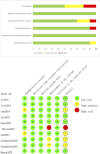Effects of Tai Chi Chuan on cognitive function in adults 60 years or older with mild cognitive impairment: a systematic review and meta-analysis
- PMID: 40236822
- PMCID: PMC11996854
- DOI: 10.3389/fphys.2025.1556622
Effects of Tai Chi Chuan on cognitive function in adults 60 years or older with mild cognitive impairment: a systematic review and meta-analysis
Abstract
Background: Mild cognitive impairment (MCI) is an intermediate stage between normal aging and dementia. Emerging evidence has demonstrated that mind-body interventions may enhance cognitive function. To elucidate whether stand-alone Tai Chi Chuan (TCC) intervention confers domain-specific benefits on executive function, memory, and global cognition, further investigations should be conducted.
Purpose: This systematic review and meta-analysis of randomized controlled trials (RCTs) examined TCC's effects on global cognition, memory, and executive function, and its duration-response relationship in adults 60 years or older with MCI.
Methods: Seven electronic databases were searched for relevant literature, with English as the sole inclusion criterion for language. The methodological quality and risk of bias for all included RCTs were assessed using the Cochrane Risk of Bias (2.0) tool. The pooled effect sizes were evaluated using standardized mean differences (SMD) and 95% confidence intervals (CI). A p-value <0.05 was considered statistically significant.
Results: Nine of the 1,442 publications met the inclusion criteria, comprising RCTs involving 1,066 participants (68.95% female) with a mean age of 74.1 (±7.4) years. Long-term TCC demonstrated significant effects on global cognition (p < 0.001; SMD = 0.488; 95% CI: 0.222-0.754), whereas short-term TCC did not (p = 0.172; SMD = 0.682; 95% CI: -0.397-1.660). Overall, TCC showed significant global cognitive benefits (p = 0.003; SMD = 0.526; 95% CI: 0.184-0.869). Long-term memory showed no improvement (p = 0.214; SMD = 0.162; 95% CI: -0.094-0.417), while short-term memory improved significantly (p = 0.021; SMD = 1.010; 95% CI: 0.155-1.865). The overall effect of TCC on memory was significant (p = 0.005; SMD = 0.580; 95% CI: 0.178-0.982). Both short-term and long-term improvements in executive function were significant (p = 0.006; SMD = -0.791; 95% CI: -1.353 to -0.230).
Conclusion: The study confirmed TCC's duration-dependent effects on global cognition in older adults (≥60 years) with MCI. Memory exhibited nonlinear temporal dynamics, characterized by short-term acceleration and long-term plateau, while executive function demonstrated temporal invariance with comparable efficacy across intervention durations.
Systematic review registration: https://www.crd.york.ac.uk/PROSPERO/home, identifier CRD42024587754.
Keywords: Tai Chi Chuan; executive function; global cognition; memory; mild cognitive impairment; older adults.
Copyright © 2025 Wang and Wang.
Conflict of interest statement
The authors declare that the research was conducted in the absence of any commercial or financial relationships that could be construed as a potential conflict of interest.
Figures








Similar articles
-
Effect of hearing aids on cognitive functions in middle-aged and older adults with hearing loss: A systematic review and meta-analysis.Front Aging Neurosci. 2022 Nov 14;14:1017882. doi: 10.3389/fnagi.2022.1017882. eCollection 2022. Front Aging Neurosci. 2022. PMID: 36452439 Free PMC article.
-
Computerised cognitive training for 12 or more weeks for maintaining cognitive function in cognitively healthy people in late life.Cochrane Database Syst Rev. 2020 Feb 27;2(2):CD012277. doi: 10.1002/14651858.CD012277.pub3. Cochrane Database Syst Rev. 2020. PMID: 32104914 Free PMC article.
-
Effects of combined cognitive and physical intervention on enhancing cognition in older adults with and without mild cognitive impairment: A systematic review and meta-analysis.Front Aging Neurosci. 2022 Jul 19;14:878025. doi: 10.3389/fnagi.2022.878025. eCollection 2022. Front Aging Neurosci. 2022. PMID: 35928994 Free PMC article.
-
Cognitive training interventions for dementia and mild cognitive impairment in Parkinson's disease.Cochrane Database Syst Rev. 2020 Feb 26;2(2):CD011961. doi: 10.1002/14651858.CD011961.pub2. Cochrane Database Syst Rev. 2020. PMID: 32101639 Free PMC article.
-
Effects of Tai Chi Chuan on Cognitive Function in Older Adults with Cognitive Impairment: A Systematic and Meta-Analytic Review.Evid Based Complement Alternat Med. 2020 Dec 28;2020:6683302. doi: 10.1155/2020/6683302. eCollection 2020. Evid Based Complement Alternat Med. 2020. PMID: 33424991 Free PMC article. Review.
References
-
- Blair S. N. (2009). Physical inactivity: the biggest public health problem of the 21st century. Br. J. sports Med. 43 (1), 1–2. - PubMed
Publication types
LinkOut - more resources
Full Text Sources
Miscellaneous

